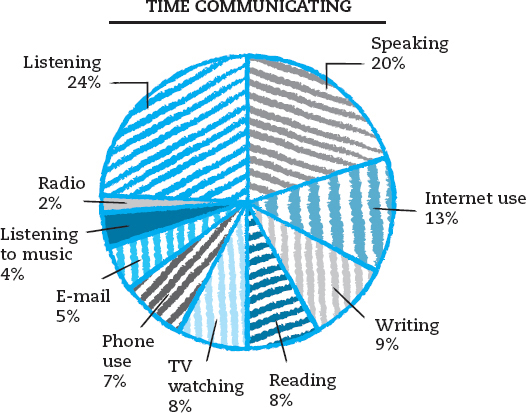Personal Listening Preferences
Personal Listening Preferences
Page 122
Each day, you spend a lot of time listening to your professors, other students, family members, and friends—more time than you spend reading or writing (as shown in Figure 6.1). Use of communication technologies can fuse these categories; for example, when you’re reading a post that your friend wrote on your Facebook wall, you’re also “listening” to the message your friend is conveying.1 Clearly, listening will remain a vital communication skill no matter how technology continues to evolve (Janusik & Wolvin, 2009).

Source: Janusik & Wolvin, 2009
But how, exactly, are you listening? Four distinct preferences, or styles, emerge when it comes to listening—regardless of whether the communication is face to face or mediated through the use of technology (Barker & Watson, 2000; Watson, Barker, & Weaver, 1995):
- People-oriented listeners listen with relationships in mind. They tend to be most concerned with other people’s feelings, are usually good at assessing others’ moods, and can listen without judging.
- Action-oriented listeners usually focus on tasks; they organize the information they hear into concise and relevant themes. They tend to keep the discourse on track, so they’re often valuable in meetings and as members of teams and organizations.
- Content-oriented listeners carefully evaluate what they hear. They usually prefer to listen to information from sources they feel are credible and to critically examine the information they receive from a variety of angles. They can be particularly effective when information is complex, detailed, and challenging.
- Time-oriented listeners are most concerned with efficiency. They prefer information that is clear and to the point and have little patience for speakers who talk too much or wander off topic. They prefer time limitations on the listening interaction.
Culture and You
Consider the examples of different listeningstyles here; in addition to individual preferences, styles may differ across cultures. Are you able to adopt different styles when listening to different groups of friends, acquaintances, family, or coworkers?
Though some people show a clear preference for one style over another, about 40 percent of people score high on two or more listening styles; thus, they can adapt their listening styles to different situations (Barker & Watson, 2000). For example, you may be more content oriented while listening to a political debate so you can analyze the information and make a judgment. But you might be more people oriented when consoling a friend because you care about maintaining the relationship. Meanwhile, you might favor action-oriented listening during a meeting on a group project or time-oriented listening when you’re working under a tight deadline.
LearningCurve